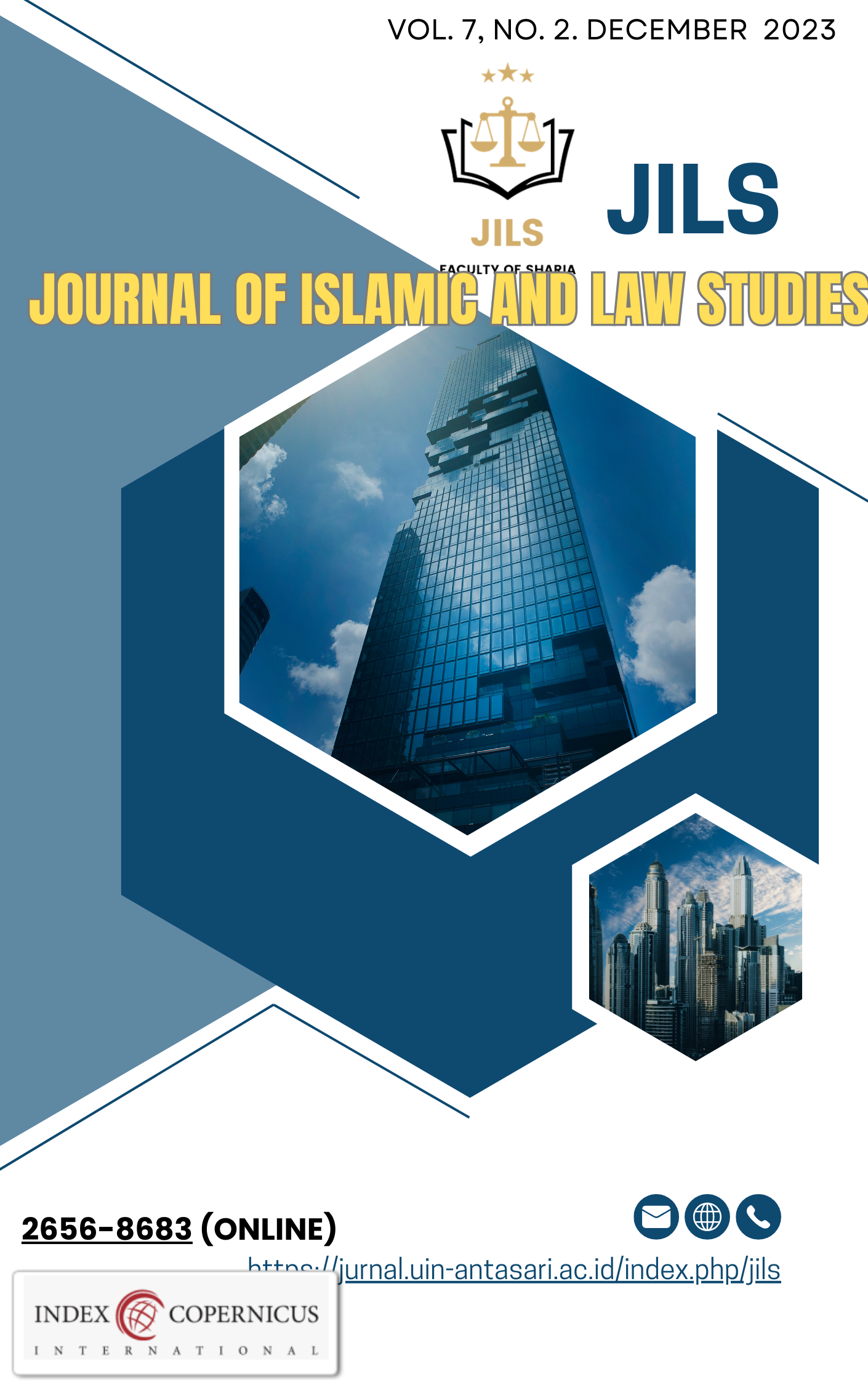Transfer Of Marriage Guardian (Analysis Of Nikah Isbat Decision Number 442/Pdt.G/2022/PA.Spt)
DOI:
https://doi.org/10.18592/jils.v7i2.12230Abstract
Abstract : The law provides a legal solution so that private marriages have protection and legal force, namely by submitting a marriage isbat to the Religious Court. One of them is a marriage whose marriage isbat was submitted to the Sampit Religious Court with case number 442/Pdt.G/2022/PA.Spt. The case was granted by the panel of judges, even though the Petitioner's marriage was unclear regarding the transfer of the marriage guardian. The marriage was held with the uncle's guardian, because his biological father could not attend because he was in Java. The issues examined in this decision are the judge's considerations in granting the marriage isbat and the author's analysis of the transfer of guardians in marriages whose marriage isbat was proposed by the Petitioner. This type of research is normative legal research with a case study approach. The findings in this research are that the Panel of Judges granted this Isbat Nikah because they saw that the harmony and conditions of marriage were fulfilled, there were no obstacles to marriage between the bride and groom, and there were no objections to the parties while the marriage was taking place. However, the Panel of Judges did not pay enough attention to the part regarding the transfer of guardians which included marital harmony. Because if you refer to the applicable provisions, the transfer of the marriage guardian that occurred was not appropriate. However, if the Panel of Judges refers to an opinion that permits or sees a greater benefit, then this can be justified. However, this is not included in the Decision. Abstrak: Undang-Undang memberikan solusi hukum agar perkawinan di bawah tangan mempunyai perlindungan dan kekuatan hukum, yaitu dengan cara mengajukan isbat nikah ke Pengadilan Agama. Salah satunya yaitu pernikahan yang diajukan isbat nikahnya ke Pengadilan Agama Sampit dengan Nomor perkara 442/Pdt.G/2022/PA.Spt. Perkara tersebut dikabulkan oleh majelis hakim, padahal pernikahan yang dilakukan Pemohon tersebut terdapat ketidakjelasan perihal perpindahan wali nikahnya. Pernikahan tersebut dilaksankan dengan wali paman, karena ayah kandungnya tidak dapat berhadir disebabkan berada di Jawa. Permasalahan yang diteliti terhadap putusan ini adalah bagaimana pertimbangan hakim dalam mengabulkan isbat nikah dan analisis penulis terhadap perpindahan wali yang terdapat dalam pernikahan yang diajukan isbat nikahnya oleh Pemohon. Jenis penelitian ini adalah penelitian hukum normatif dengan pendekatan studi kasus (Case Study). Temuan dalam penelitian ini adalah bahwa Majelis Hakim dalam mengabulkan Isbat Nikah ini karena melihat terpenuhinya rukun dan syarat nikah, tidak ada penghalang nikah antara kedua mempelai, dan tidak ada pihak yang keberatan selama pernikahan itu berlangsung. Namun Majelis Hakim kurang memperhatikan bagian perpindahan wali yang termasuk rukun nikah. Karena apabila merujuk pada ketentuan yang berlaku, perpindahan wali nikah yang terjadi kurang tepat. Adapun apabila Majelis Hakim merujuk pada pendapat yang membolehkan atau melihat sisi maslahat yang lebih besar, maka hal ini dapat dibenarkan.Downloads
Published
2023-12-15
Issue
Section
Articles
License
Copyright (c) 2023 Novita Novita, Budi Rahmat Hakim

This work is licensed under a Creative Commons Attribution-NonCommercial 4.0 International License.
Authors who publish with this journal agree to the following terms:
- Authors retain copyright and grant the journal right of first publication with the work simultaneously licensed under a Creative Commons Attribution License that allows others to share the work with an acknowledgement of the work's authorship and initial publication in this journal.
- Authors are able to enter into separate, additional contractual arrangements for the non-exclusive distribution of the journal's published version of the work (e.g., post it to an institutional repository or publish it in a book), with an acknowledgement of its initial publication in this journal.
- Authors are permitted and encouraged to post their work online (e.g., in institutional repositories or on their website) prior to and during the submission process, as it can lead to productive exchanges, as well as earlier and greater citation of published work.




